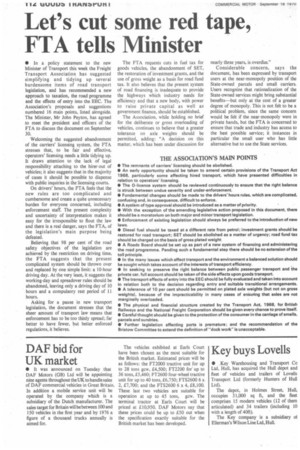THE ASSOCIATION'S MAIN POINTS
Page 114

If you've noticed an error in this article please click here to report it so we can fix it.
• The remnants of carriers' licensing should be abolished.
• An early opportunity should be taken to amend certain provisions of the Transport Act 1968, particularly some affecting hired transport, which have presented difficulties in relation to operators' licensing.
• The 0-licence system should be reviewed continuously to ensure that the right balance is struck between undue severity and under-enforcement.
• Fundamental changes should be made to the drivers' hours rules, which are complicated, confusing and, in consequence, difficult to enforce.
• A system of type approval should be introduced as a matter of priority.
• With the exception of the amending legislative action proposed in this document, there should be a moratorium on both major and minor transport legislation.
• Enforcement of existing legislation should always be preferred to the introduction of new laws.
• Diesel fuel should be taxed at a different rate from petrol; investment grants should be restored for road transport; SET should be abolished as a matter of urgency; road fund tax should be charged on the basis of gross plated weight • A Roads Board should be set up as part of a new system of financing and administering the road programme. Pending such a fundamental step there should be no extension of the toll principle.
• In the many issues which affect transport and the environment a balanced solution should be sought which takes account of the interests of transport efficiency. • In seeking to preserve the right balance between public passenger transport and the private car, full account should be taken of the side effects upon goods transport.
• The transport effects of entry into the EEC should be fully evaluated and taken into account in relation both to the decision regarding entry and suitable transitional arrangements. II A tolerance of 10 per cent should be permitted on plated axle weights (but not on gross weights), because of the impracticability in many cases of ensuring that axles are not marginally overloaded.
• The physical and financial structure created by the Transport Act, 1968, for British Railways and the National Freight Corporation should be given every chance to prove itself.
• Careful thought should be given to the protection of the consumer in the carriage of smalls, parcels and sundries.
• ' Further legislation affecting ports is premature; and the recommendation of the Bristow Committee to extend the definition of "dock work" is unacceptable.






























































































































































































































































































































































































